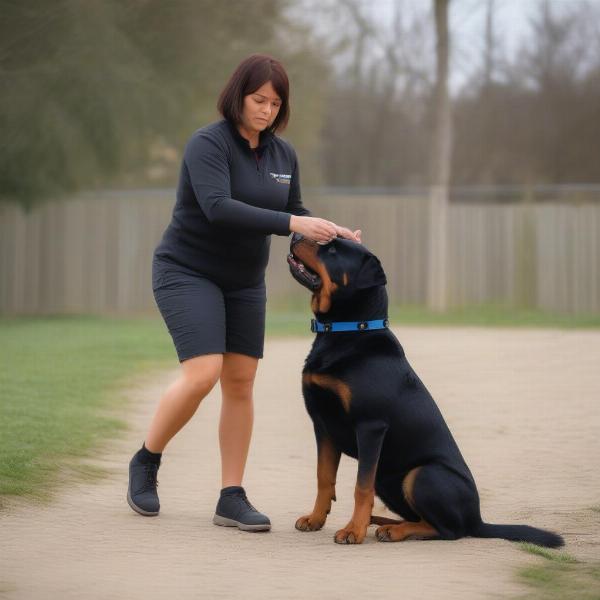Tough dogs are known for their resilience, strength, and often, their protective instincts. But what does “tough” really mean when it comes to dog breeds? It’s not just about physical prowess; it encompasses mental fortitude, adaptability, and a willingness to work. Choosing a tough dog breed is a big decision, as these dogs often require experienced owners who can provide the right training, socialization, and environment for them to thrive. This article explores what constitutes a “tough dog,” discusses suitable breeds, and provides guidance on how to care for these robust companions.
Defining a “Tough Dog”
When we think of tough dogs, certain breeds immediately come to mind. But toughness isn’t solely defined by size or muscular build. It’s a combination of physical and mental attributes. Physical toughness can include a high pain tolerance, robust physique, and endurance. Mental toughness, however, is equally important and involves traits like resilience, a strong work ethic, and the ability to handle stressful situations. Many tough dog breeds were originally bred for demanding jobs like herding livestock, guarding property, or participating in dog sports.
Breeds Known for Their Toughness
Several breeds consistently rank high on the “tough dog” scale. Rottweilers, for example, are powerful and intelligent, known for their protective nature. German Shepherds are another popular choice, prized for their intelligence, trainability, and versatility. American Staffordshire Terriers, often referred to as AmStaffs, are known for their strength and loyalty. Other breeds like the Rhodesian Ridgeback, Cane Corso, and Dogo Argentino also fall into this category, each possessing unique strengths and characteristics that contribute to their toughness.
 Tough Dog Training and Socialization
Tough Dog Training and Socialization
Caring for a Tough Dog
Owning a tough dog comes with significant responsibility. These dogs require experienced owners who can provide consistent training, socialization, and plenty of physical and mental stimulation. Early socialization is crucial to ensure they develop into well-adjusted adults who can interact appropriately with other dogs and people. Training should be firm but positive, focusing on building a strong bond between dog and owner.
Exercise and Mental Stimulation
Tough dogs need ample opportunities to burn off energy and engage their minds. Daily exercise is essential, whether it’s a brisk walk, a run in the park, or a challenging hike. Mental stimulation is equally important and can be provided through puzzle toys, training sessions, or interactive games.
Health and Nutrition
Providing a balanced diet tailored to your dog’s specific needs is vital for maintaining their physical toughness. High-quality dog food formulated for active breeds is recommended. Regular veterinary checkups are also essential to ensure your tough companion stays healthy and strong.
Conclusion
Tough dogs can make loyal and devoted companions for the right owner. However, it’s important to understand the commitment involved in owning one. These dogs require experienced owners who can provide the necessary training, socialization, exercise, and care to ensure they thrive. By understanding their specific needs and providing a structured environment, you can build a strong bond with your tough canine companion and enjoy a fulfilling partnership.
FAQ
-
What makes a dog breed “tough”? Toughness in dogs encompasses both physical attributes like strength and endurance, and mental characteristics like resilience and a strong work ethic.
-
Are tough dogs suitable for first-time owners? Generally, tough dog breeds are better suited for experienced owners who can handle their specific needs.
-
How much exercise does a tough dog need? Tough dogs require ample daily exercise, including physical activities like running and mental stimulation through training or puzzle toys.
-
What kind of diet should I feed my tough dog? A high-quality dog food formulated for active breeds is recommended.
-
Is early socialization important for tough dogs? Yes, early socialization is crucial for all dogs, especially tough breeds, to ensure they develop into well-adjusted adults.
-
What are some examples of tough dog breeds? Rottweilers, German Shepherds, American Staffordshire Terriers, Rhodesian Ridgebacks, Cane Corsos, and Dogo Argentinos are some examples of breeds known for their toughness.
-
Where can I find more information about specific tough dog breeds? Check out our articles on tough dog toys australia, rough and tough dog toys and tough dog harness. You can also learn more about kennels suited for tough dogs by checking out our article on tough dog kennel or find information on tough dog suspension in Perth by reading our article on tough dog suspension perth.
About ILM Dog
ILM Dog is your premier resource for expert advice on dog breeds, health, training, nutrition, grooming, and much more. We’re dedicated to providing practical and reliable information to help dog owners worldwide provide the best possible care for their canine companions. From choosing the right breed to navigating the challenges of dog ownership, ILM Dog offers a wealth of knowledge to empower you on your dog parenting journey. For expert advice, contact us at [email protected] or +44 20-3965-8624.